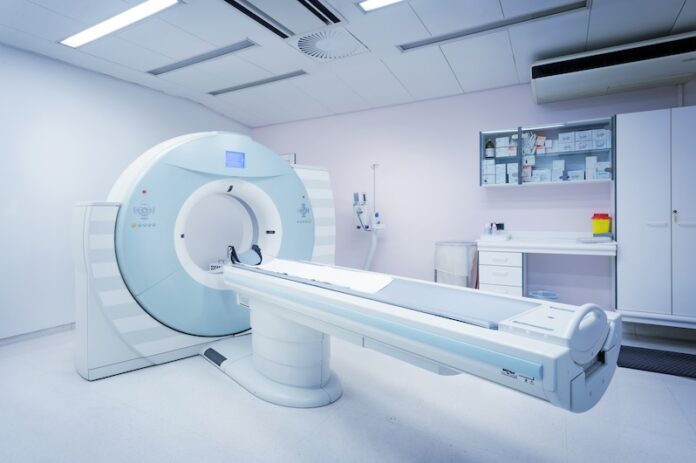Acquiring knowledge is often a critical first step in making meaningful change within a health care organization. The purpose of the CAR’s new CT Accreditation Program (CTAP) is to help organizations and facilities analyze data to better understand their own processes, policies, and technologies, with the aim of ensuring the highest possible standard of CT care.
The CTAP is nearing the end of its pilot stage at Niagara Health under the leadership of Diagnostic Imaging Director Dr. Julian Dobranowski (McMaster University). He believes that maintaining a high standard of imaging care is a critical responsibility.
“The medical imaging department at Niagara Health is focused on providing high-quality medical imaging care to all our patients,” said Dr. Dobranowski. “We have a duty to perform the right test safely and efficiently. Being leaders in quality is a privilege and we are thrilled to be helping the development and piloting of CT accreditation with the CAR.”
Investigating equipment or procedures that are dated or have been taken for granted over time, like monitor specifications or testing processes, is an exercise in preventing risk instead of reacting to it. For Niagara Health, the CTAP has unearthed the need to create a standardization of policy across their health network and an awareness of the differing needs within that network.
“Taking part in the CTAP was a great opportunity to step back and to review all aspects of the patient’s journey having a CT scan examination,” said Dr. Dobranowski. “It gave us a chance to identify any gaps in our policies and processes and to fill them in where necessary. It was a chance to compare the standards we had in place and bring them in line with the updated standards produced by the CAR.”
The purpose of the CAR’s new CT Accreditation Program (CTAP) is to help organizations and facilities analyze data to better understand their own processes, policies, and technologies, with the aim of ensuring the highest possible standard of CT care.
“At Niagara Health, three sites are equipped with CT scanners,” said Stephanie Krajcovic, a registered MRT and CT Technologist at Niagara Health. “Through the CTAP experience, we’ve learned each site has its own unique operational differences based in part by the facility set-up and available resources. While the majority of our processes and policies are standard across all sites, it was discovered that there are a few processes that vary between sites.”
Additionally, the CTAP is revealing the value of a heightened focus on quality assurance for things that might not be obvious, like the need to test a room and its walls for radiation every five years instead of only performing an initial acceptance test or understanding the difference in monitor quality for technologists and radiologists and the potential consequences. The CTAP has also enhanced staff knowledge about the CT modality and equipment usage, resulting in an increase in accredited education activities undertaken by team members. Sharing knowledge within an organization and to the patient population elevates the work being done in your facility and creates a standard that brings people together.
“We are currently working on quality assurance processes necessary for the accreditation program,” said Krajcovic. “This next phase requires staff training and schedule evaluation for time allotment to execute. There are also policies requiring the managers and radiologists to work collaboratively for implementation.”
Accrediting your facility through the CTAP works to protect patients, staff, and the institution with best practices which are so specific to the CT modality that you can rest assured your department is safe and effective in delivering high-quality care. It is a voluntary program for facilities that want to increase CT standards for their patients through continuous quality improvement.
If you are interested in finding out more about the CAR’S CT Accreditation Program or other accreditation programs, please contact Marc Venturi, Director of Accreditation and Quality.


